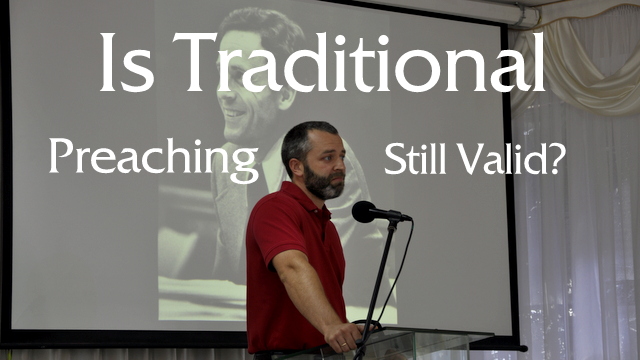In biblical times there were few methods of communication to choose from. If you needed to communicate something to a large audience your best option was to find a crowd and speak real loud. You could also write, but few people could read, so your audience would be limited.

When I grew up church copy machines were becoming a big thing and if you wanted to reach a larger audience you could start a tape ministry. When we started putting the words to songs on the overhead projector a few members even raised objections.
Increased Options
The options for communication are so vast today that many churches don’t know where to start, as a result some play it safe and by sticking closely to methods developed in the 1950s and 60s. Other churches jump head first into the sea of youtube clips featuring star preachers and spectacular music.
Increased Volume
This invasion of media did not start in the church but in society. In contemporary homes most people consume a constant diet of TV, film, music and video clips. When they are not at home it is streaming into their ears and eyes via smart-phones and tablets. An information downpour soaks us all week-long!
Increased Interaction
Not only are you and I consuming media all week-long but we are also participating in the conversation. Facebook, Google+, Twitter and Pinetrest provide highly addictive interactive methods of communication, not to mention the online gaming community. Our minds are addicted to constant communication and instant information all fed to us in short bursts.
Here are the questions that you and I need to answer:
1. Does traditional preaching still have a place in our culture of massive media intake?
2. Should preaching change to meet the needs of a society addicted to soundbites and video clips? How?
3. Can/should traditional preaching be replaced by other forms of teaching like film, books, video clips?
Leave your answers in the comments below.
Read my other posts about preaching here.











Giles
May 9, 20131. Yes. I think traditional preaching (find a large crowd & speak real loud) has a place.
2. No. Maybe add on: post clips/videos on Internet, tweet some, etc. But not to switch from traditional to anything else entirely.
3. No. Not be replaced. My issue with other forms of preaching isn’t that they don’t work or aren’t appropriate, but from personal observation: they all want money. They seem to shove it in your face. It takes money to do those things, so they need money to keep doing it, but it seems like a lot of people spend an inappropriate amount of time asking for money. I think videos, books, etched, have their place, but people learn most from real people doing real preaching. I know I do. I can easily find a video that sounds nicer to me & appeases my tastes but may have no truth in it. “Having a form of godliness, but denying the power thereof.”
How then shall they call on him in whom they have not believed? and how shall they believe in him of whom they have not heard? and how shall they hear without a preacher? -Romans 10:14
And how shall they preach, except they be sent? as it is written, How beautiful are the feet of them that preach the gospel of peace, and bring glad tidings of good things! -Romans 10:15
But they have not all obeyed the gospel. For Esaias saith, Lord, who hath believed our report? -Romans 10:16
So then faith cometh by hearing, and hearing by the word of God. -Romans 10:17
Just my two cents. Hope it made sense lol. Bottom line, for me: videos are easily turned off; a preacher isn’t as easily silenced.
Caleb
May 9, 2013Giles, I think you have a great point about the fact that preaching doesn’t really cost you anything especially if you compare it to the cost of preparing a video or other media. The simplicity of just verbally communicating is something that will always make it the primary way we communicate most messages.
Thanks for dropping by and answering the questions!
Jeremy Wilson
May 14, 2013I think that trying to meet entertainment desires of the world is one aspect of what is wrong in American churches today. Granted, Jesus did miracles,and that brought “media attention” but he went out and demonstrated Gods love and peached Truth with no apologies. He preached for a short time with no multimedia, and changed the world. Is there a place for technology? Absolutely, I am following a brother in Christ I did not know because of technology, but too often churches and pastors worry more about the image they portray rather than the message that might, and normally does, offend. Great article to get the mental and spiritual juices flowing.
God bless,
Jeremy
Ps. Thanks for the twitter follow my wife and I along with our 8 children move to Kenya in August.
Caleb
May 14, 2013Jeremy, I think you’re right, it’s so easy to start focusing on the technology and the methods of communication and forget about the importance of the simple truths that need to be communicated! It seems to me that the best preachers were focused primarily on truth and any technology that happened to be used was just another tool to help communicate to a wider audience.
Blessings on your move to Kenya!
Loren Pinilis
May 23, 2013I don’t think there’ anything magical about being in the same room with a preacher in terms of listening to a sermon. However, I think that’s usually best since there are a lot of other benefits such as participating in corporate worship, being around other believers, being part of the body, etc.
But I think even better is when video sermons and audio sermons are added on top. I like to listen to multiple sermons from multiple pastors in a week – not as a substitute for my pastor, but as a supplement.
Caleb
May 28, 2013Loren I also listen to sermons online on a regular basis. I think this is especially important for someone like me who ends up preaching the main sermon much of the time. It’s important that I have solid biblical input into my life from others. Of course I get that in our church too but it’s nice that I have the opportunity to listen to others online as well. I often listen to our home church http://discoverybaptist.org and I listen to others like Mark Driscoll, John Piper, John MacArthur and David Platt.